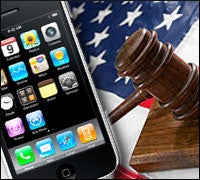 |
With the wireless industry facing mounting scrutiny from lawmakers and regulators, many observers took the recent inquiry into Apple’s policies governing the App Store for its popular iPhone as a down payment on a broader regulatory probe.
The Federal Communications Commission’s review centered on the Apple’s (NASDAQ: AAPL) decision to keep Google Voice, an application that manages voice and data features across multiple phone numbers, out of the app store.
Last Friday, the FCC received responses to its questions about the decision from Apple, Google and AT&T, the iPhone’s exclusive U.S. carrier.
Given the heightened interest in Washington surrounding numerous practices of the wireless industry, including whether regulators should mandate open-access requirements that would mandate that applications such as Google Voice and Skype be allowed to run on any device on any network, the timing of the FCC inquiry hardly seemed a coincidence.
After all, the commission is holding a meeting this Thursday where it plans to open two inquiries into the wireless industry, probing the issues of competition, innovation and investment.
But the connection between the Google-iPhone flap and the coming FCC review does not appear to be strong as has been widely suggested. An FCC source told InternetNews.com that the notices of inquiry (NOI) to be released at Thursday’s meeting are “opportunities for information gathering,” and are not intended as a prelude to a regulatory crackdown on any one of the constellation of issues in the policy debate surrounding the wireless industry.
The source spoke on condition of anonymity because the NOIs have not yet been made public.
The source said that individual issues such as open access would almost certainly factor into many of the responses the FCC receives, but that the questions would not likely be targeted to specific industry practices.
In addition to open access, regulators and lawmakers have been probing handset exclusivity agreements, text-messaging rates, the fees carriers charge consumers for ending their contract early and special access rates, the prices carriers charge their competitors for the use of the so-called middle mile of their networks, known as special access fees.
In their responses, Apple and AT&T (NYSE: T) both said that the decision to keep Google Voice out of the app store was made by Apple alone, and they noted that iPhone users could still access the Web-based version of the app.
The companies’ responses helped defuse speculation that AT&T was acting as an unseen hand in the app store, leaning on Apple to block potentially competing services like Google Voice, but regulators aren’t likely to drop the issue.
“Even though the recent responses were somewhat anticlimactic, we think it is likely that the FCC will continue to look into wireless openness,” Stifel Nicolaus analyst Rebecca Arbogast wrote in a research note.
An FCC spokesman told InternetNews.com that “we are reviewing” the responses from Apple, AT&T and Google (NASDAQ: GOOG).
The concerns about open access, of course, are much wider than just Google Voice. In their responses, AT&T and Apple described contractual provisions requiring Apple to gain approval from AT&T before allowing VoIP applications such as Skype tap into the carrier’s 2G and 3G networks. Skype is only available on the iPhone when a user is connected through a Wi-Fi network.
Perhaps in a nod to the mounting regulatory scrutiny, AT&T said in its response that it planned to take a “fresh look at possibly authorizing VoIP capabilities on the iPhone for use on AT&T’s 3G network.”
Christopher Libertelli, Skype’s senior director of government and regulatory affairs, greeted that tentative commitment with cautious optimism.
“We welcome AT&T’s willingness to take a fresh look at authorizing VoIP capabilities on the iPhone over AT&T’s 3G network,” Libertelli said in a statement e-mailed to InternetNews.com. “Skype hopes this is a step forward in enabling consumers to be able to use Skype together with their iPhones and 3G connections and looks forward to hearing more about any potential change to AT&T’s policy.”
Skype has been at the center of the open access debate since at least 2007, when it petition the FCC to extend the 1968 Carterfone ruling that required AT&T to open its landline network to outside devices and applications to the wireless industry.
“The issue has not gone away,” Larry Spiwak, president of the Phoenix Center, a Washington think tank that focuses on telecom policy, told InternetNews.com. “The FCC never granted the Skype petition, it never denied the Skype petition.”
The Skype and Google Voice cases are both offshoots of the open access debate, but from a regulatory perspective, they could be in different leagues, particularly since Apple said it acted alone in blocking Google’s app.
“In the absence of an AT&T role, the FCC’s legal authority to intervene in Apple’s decisions of what to include in its App Store is not apparent,” Arbogast said.
Spiwak agreed, saying, “It’s a gray area. It depends on who you ask. The question is whether or not they will assert jurisdiction, and whether or not the courts will uphold it.”
Perhaps predictably, advocacy groups such as Free Press have framed the issue in the context of the long-simmering debate over Net neutrality on the traditional Web.
For Free Press, AT&T’s role in blocking Skype, as well as its admission that it inveighed on Apple to limit access to a handful of other bandwidth-intensive applications for fear of network congestion, invites the troubling scenario where the service provider decides what applications the user can access.
“This inquiry has exposed the central issue of who controls the mobile Internet,” Free Press Policy Director Ben Scott said in a statement regarding Friday’s responses. “It’s time for the FCC to move quickly to pass new rules to prohibit exclusive contracts for devices and violations of network neutrality.”


